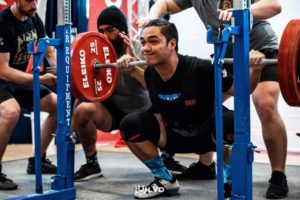We all have moments where all we want to do is stop thinking. Methods of escape vary depending on the person: music, food, books, booze, or exercise—everyone has a different method to their madness. For first-year Exercise and Wellness student Eric Zhao—who founded the Camosun Powerlifting Club—it’s definitely exercise. He’s been lifting weights since the age of 11; as he got more into it, lifting progressed into powerlifting, a sport and escape for Zhao, who hopes to get a national record one day.
“My last competition, I was able to bench press 170 kilos, which is roughly 370 pounds,” says Zhao.
Zhao applied for a provincial competition when he was younger but didn’t know about the age restrictions, so couldn’t compete.
“Part of that was due to my lack of knowledge with how competitions work,” he says.
Easy access to information like start dates, age restrictions, and the type of lifting the athlete wants to focus on was part of why Zhao wanted to start a powerlifting club at Camosun. Form is important, says Zhao, so it’s often what students opt to work on during club training sessions.
“If anyone has interest in competing, they will have a group of support, and they will have help in getting down the basics,” says Zhao, who competed in the annual Lift the Rock Powerlifting Championships in Victoria last year and is hoping to again this year.
Zhao says that mental preparation is key for him.
“It helps you take your mind off other things and concentrate solely on the sport itself; you’re able to essentially focus on what you are doing right now, and not think about possible school papers or whatnot,” he says. “It’s a form of escape, but it’s also a form of mental conditioning.”
When Zhao’s lifting for a personal record, being prepared mentally comes with being prepared physically, he says, adding that overthinking is something to be avoided.
“What I try to do is visualize the perfect lift and focus on what movement—a form or such—is critical to the lift itself,” he says. “I concentrate on that before starting the lift, and only that.”
Zhao says that as people lift and compete more, injuries become more likely, as they do with any sport; proper form is the best way to combat that.
“With the right form you can get a certain advantage, as long as you follow all the rules of the lift,” says Zhao.
With bench pressing, one of Zhao’s areas of focus, good form includes the lifter keeping their back arched to decrease the range of motion, keeping their shoulders back, and not usually going 100 percent during training.
“Most powerlifters I’ve seen do three reps of a lower weight,” he says, “and they do many sets of that.”
When a person competes, they do only one rep of a higher weight, says Zhao; it’s called “heavy singles,” where the lifter lifts as much as they possibly can for one rep.
“You use 95 or 97.5 percent of your rep max, and you just do them for reps of one, so it’s slightly lighter than your absolute limit,” he says. “You train your form and your mental preparation for the competition itself. For two weeks prior to the competition, they load up on volume. So they do many sets.”
See camosunstudent.org/clubs to contact the Powerlifting Club.

